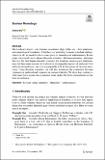Boolean Mereology
Author(s)
Wu, Xinhe
Download10992_2022_Article_9686.pdf (1.245Mb)
Publisher with Creative Commons License
Publisher with Creative Commons License
Creative Commons Attribution
Terms of use
Metadata
Show full item recordAbstract
Abstract
Most ordinary objects - cats, humans, mountains, ships, tables, etc. - have indeterminate mereological boundaries. If the theory of mereology is meant to include ordinary objects at all, we need it to have some space for mereological indeterminacy. In this paper, we present a novel degree-theoretic semantics - Boolean semantics - and argue that it is the best degree-theoretic semantics for modeling mereological indeterminacy, for three main reasons: (a) it allows for incomparable degrees of parthood, (b) it enforces classical logic, and (c) it is compatible with all the axioms of classical mereology. Using Boolean semantics, we will also investigate the connection between vagueness in parthood and vagueness in existence/identity. We show that, contrary to what many have argued, the connection takes neither the form of entailment nor the form of exclusion.
Date issued
2022-11-09Department
Massachusetts Institute of Technology. Department of Linguistics and PhilosophyPublisher
Springer Netherlands
Citation
Wu, Xinhe. 2022. "Boolean Mereology."
Version: Final published version